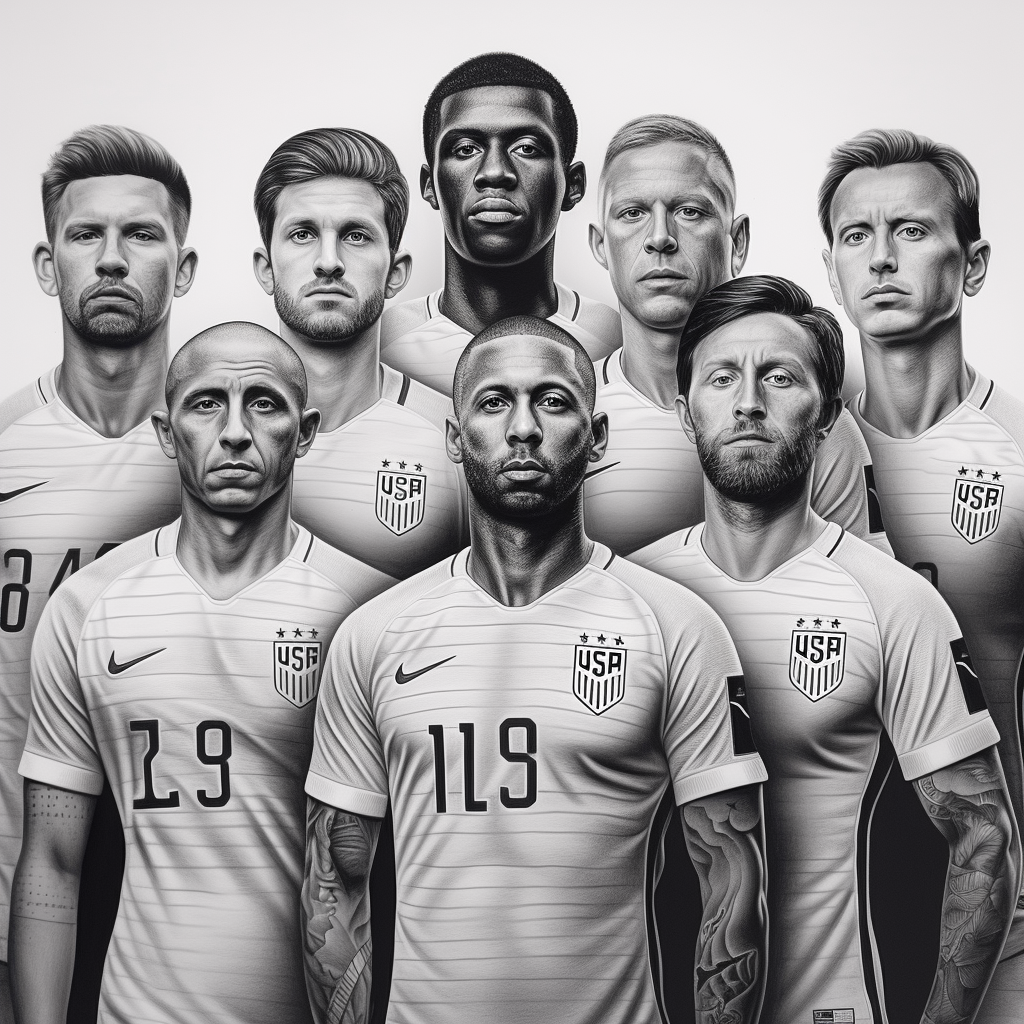
Welcome to the enthralling universe of Major League Soccer History (MLS), a realm where athleticism and strategy blend to create a spectacle of skill and passion.
In this exploration, we delve deep into the annals of MLS, tracing its historical roots, charting its ascending trajectory in popularity and influence, and examining its transformative role in reshaping the sports culture within the United States.
This journey is not just about the game, but the evolution of a phenomenon that mirrors societal shifts and embodies the spirit of American sportsmanship.
What is Major League Soccer?
Major League Soccer, commonly known as MLS, is the premier professional soccer league in both the United States and Canada. It was established in 1993 as a result of the successful bid to host the 1994 FIFA World Cup in the United States. MLS officially kicked off its inaugural season in 1996 with ten teams.
One unique aspect of MLS is its single-entity structure, which means that the league owns all the teams and player contracts. This structure ensures financial stability and helps maintain a competitive balance within the league.
Growth and Popularity of MLS
Over the years, MLS has experienced remarkable growth and gained significant popularity among sports enthusiasts in North America. The league’s fan base has expanded rapidly, attracting passionate supporters from diverse backgrounds.
A key factor contributing to MLS’s popularity is the presence of world-class stadiums specifically designed for soccer. These soccer-specific stadiums provide an intimate and electrifying atmosphere for fans, enhancing their overall experience.
In recent years, MLS has witnessed a surge in attendance figures and TV ratings. This increased interest can be attributed to the league’s efforts to attract top international players, as well as the rise of homegrown talent. The level of play has significantly improved, making MLS an exciting and competitive league to watch.
Significance of MLS in the United States Sports Landscape
MLS holds immense significance in the United States sports landscape. It has played a crucial role in popularizing soccer and cultivating a thriving soccer culture in the country. The league’s presence has provided opportunities for young players to pursue their dreams and develop their skills at a professional level.
Moreover, MLS has helped bridge the gap between American soccer and the global stage. The league’s success has drawn attention from international soccer communities, attracting renowned players from around the world. This exposure has not only elevated the quality of play but also contributed to the growth of soccer fandom in the United States.
As MLS continues to evolve and expand, it has the potential to become one of the premier soccer leagues globally, further solidifying its significance in the United States sports landscape.

Key Milestones in MLS History
1996-2000: Establishing a Foundation
The years from 1996 to 2000 were crucial for Major League Soccer (MLS) as it worked towards establishing a solid foundation. During this period, MLS experienced significant growth and development, laying the groundwork for its future success.
MLS witnessed the addition of new teams, expanding the league’s reach and fan base.
Star players like Alexi Lalas, Cobi Jones, and Marco Etcheverry emerged, capturing the attention of soccer enthusiasts across the country.
Despite initial financial struggles, MLS managed to gain stability through strategic partnerships and investments.
2001-2006: Expansion and New Opportunities
The period from 2001 to 2006 marked a phase of expansion and new opportunities for MLS. The league continued to grow in size and popularity, seizing exciting opportunities to elevate its status in American sports.
MLS expanded further with the addition of new teams like Real Salt Lake, Chivas USA, and Toronto FC.
The introduction of designated players, such as David Beckham and Cuauhtémoc Blanco, brought international star power and heightened media attention to the league.
One of the notable achievements during this period was the establishment of soccer-specific stadiums, providing dedicated venues for MLS matches and enhancing the overall fan experience.
2007-2012: Growth and Increased Visibility
In the years spanning from 2007 to 2012, MLS experienced significant growth in terms of fan base and media coverage. The league implemented various initiatives that further raised its profile and solidified its position in the American sports landscape.
MLS expanded its fan base through strategic marketing efforts and increased media coverage, attracting a broader audience.
The introduction of the Designated Player Rule allowed for the signing of high-profile international players like Thierry Henry and Robbie Keane.
Notable events during this period included David Beckham’s highly anticipated arrival in MLS, which generated immense excitement and propelled the league into the global spotlight.
2013-Present: Rising Popularity and Global Recognition
In recent years, MLS has experienced a surge in popularity and garnered global recognition. The league’s efforts to attract top international players, expand with new teams, and enhance the overall fan experience have contributed to its continued success.
MLS has witnessed increased attendance and TV ratings, indicating a growing interest in soccer across the United States.
The expansion of the league with new teams and state-of-the-art stadiums has further solidified MLS’s presence in various cities.
MLS has actively pursued top international players, such as Zlatan Ibrahimović and Carlos Vela, showcasing its ambition to compete globally.
As MLS continues to evolve, it remains a pivotal force in shaping the soccer landscape in the United States and holds immense potential for future growth and success.

MLS Statistics and Records
Top Goal Scorers in MLS History
When it comes to Major League Soccer, there have been some incredible goal scorers who have left their mark on the league. These players have showcased their skills and provided fans with unforgettable moments. Here are some of the all-time leading goal scorers in MLS:
Chris Wondolowski: With an impressive total of 166 goals, Wondolowski holds the record for the most goals scored in MLS history. His ability to consistently find the back of the net has made him a legendary figure in the league.
Landon Donovan: A true icon in American soccer, Donovan has scored 145 goals throughout his MLS career. His agility, technique, and game intelligence allowed him to consistently contribute to his team’s success.
Jeff Cunningham: Cunningham’s speed and precision helped him score 134 goals in MLS. His ability to create scoring opportunities for himself and his teammates made him a formidable force on the field.
Jaime Moreno: As one of the pioneers of MLS, Moreno scored an impressive 133 goals during his career. His technical skills and understanding of the game made him a key player for D.C. United.
Kei Kamara: Known for his aerial prowess, Kamara has scored 129 goals in MLS. His ability to dominate in the air and convert crosses into goals has made him a valuable asset to multiple teams.
These players have not only left their mark on MLS but have also set records that will be hard to break. Their contributions to the league have been nothing short of remarkable.

Most Successful MLS Teams
In addition to individual records, there are teams in MLS that have consistently achieved success and left a lasting impact on the league. These teams have dominated the competition and have been home to some of the league’s greatest players. Here are some of the most successful MLS teams:
LA Galaxy: The LA Galaxy holds the record for the most MLS Cup championships, with a total of five titles. Led by star players such as David Beckham and Landon Donovan, the Galaxy established a legacy of success in the league.
D.C. United: With four MLS Cup championships to their name, D.C. United has been a dominant force in MLS history. The team’s success can be attributed to the contributions of notable players like Jaime Moreno and Ben Olsen.
San Jose Earthquakes: The San Jose Earthquakes have also won multiple MLS Cup championships, with two titles to their name. Their success can be credited to players like Ronnie Ekelund and Landon Donovan.
Houston Dynamo: Since their inception, the Houston Dynamo has consistently been one of the top teams in MLS. With two MLS Cup championships under their belt, they have established themselves as a force to be reckoned with.
Seattle Sounders FC: Known for their passionate fan base and record-breaking attendance figures, Seattle Sounders FC has become one of the most successful teams in recent years. They have won multiple MLS Cup championships and continue to be a powerhouse in the league.
These teams have not only achieved success on the field but have also played a significant role in shaping the history of MLS. Their dominance and contributions to the league cannot be overlooked.
Attendance and Fan Engagement
One of the key indicators of MLS’s growth and popularity is its attendance figures and fan engagement. Over the years, MLS has seen a significant increase in both attendance and passionate fan bases. Here are some highlights:
Record-breaking Attendance: MLS has witnessed impressive attendance figures, with several clubs consistently drawing large crowds. Teams like Atlanta United FC and Seattle Sounders FC have set new records for average attendance, creating an electric atmosphere in their stadiums.
Supporters’ Culture: MLS has fostered a unique supporters’ culture, with fan groups known for their passion and dedication to their teams. These supporters bring vibrant energy to matches, creating an unforgettable experience for both players and fans.
Fan Engagement Initiatives: MLS has embraced various initiatives to engage fans and enhance their matchday experiences. From interactive fan zones to community outreach programs, the league has made efforts to connect with its supporters on a deeper level.
The growth of attendance and fan engagement in MLS is a testament to the league’s increasing popularity and the passionate soccer community in the United States. It showcases the strong connection between the teams and their fans, making each match an extraordinary event.

Famous Players in MLS History
David Beckham: Revolutionizing MLS
When David Beckham joined the LA Galaxy in 2007, it marked a turning point for Major League Soccer. Beckham’s arrival brought unprecedented attention and interest to the league, both domestically and globally. As a world-renowned superstar, his decision to play in MLS signified the league’s potential and provided a significant boost to its credibility.
Beckham’s impact on MLS extended far beyond his on-field performances. He became a symbol of the league’s ambition and attracted other high-profile players to join MLS. His presence raised the profile of American soccer and helped establish MLS as a viable destination for international stars looking for new challenges.
One of Beckham’s most notable contributions was his role in expanding the league’s fan base. His celebrity status attracted new fans who were drawn to the excitement and spectacle surrounding his games. Additionally, Beckham’s endorsement deals and business ventures connected MLS to mainstream media and entertainment industries, further elevating its visibility.
Landon Donovan: Iconic American Player
Landon Donovan is widely regarded as one of the greatest players in MLS history. Throughout his career, he showcased exceptional skill, versatility, and leadership on the field. Donovan played a crucial role in advancing American soccer and inspiring a generation of young players.
Donovan’s record-breaking achievements speak volumes about his impact on MLS. He holds the all-time record for both goals scored and assists, solidifying his status as a true icon of American soccer. His performances consistently dazzled fans and demonstrated the level of talent that existed within MLS.
Beyond his individual success, Donovan’s influence on American soccer extends to his commitment to youth development. He served as a mentor and role model for aspiring young players, encouraging them to pursue their dreams and showcasing the possibilities within MLS.
Thierry Henry: Elevating the Game
Thierry Henry’s arrival in MLS marked another significant milestone in the league’s history. As a former Arsenal and French national team star, Henry brought a wealth of experience, skill, and charisma to the teams he played for in MLS.
Henry’s impact on the league went beyond his performances on the field. His technical ability and tactical awareness elevated the level of play within MLS. He showcased a style of soccer that emphasized creativity, finesse, and intelligent positioning.
Henry’s influence extended beyond his own team. His presence inspired a new generation of players who sought to emulate his playing style and professionalism. He became a mentor for young talents within MLS, imparting his knowledge and sharing his experiences to help them reach their full potential.
Zlatan Ibrahimović: MLS’s Larger-Than-Life Personality
Zlatan Ibrahimović’s stint in MLS left an indelible mark on the league. Known for his larger-than-life personality both on and off the field, Ibrahimović brought excitement, charisma, and a touch of arrogance to MLS.
Ibrahimović’s performances in MLS were nothing short of remarkable. He displayed incredible skill, scoring breathtaking goals and providing memorable moments that captivated fans across the country. His ability to generate excitement and media attention showcased the growing relevance and global appeal of MLS.
Off the field, Ibrahimović’s personality added an extra layer of intrigue to the league. His confidence and charisma made him a magnet for media attention, bringing further visibility to MLS. He embraced the American soccer culture and became a fan favorite, leaving a lasting impression on those who had the opportunity to witness his time in MLS.

MLS Teams and Their Impact
Seattle Sounders FC: The Standard-Bearer
The Seattle Sounders FC is one of the most successful and popular teams in Major League Soccer. With a passionate fan base and record-breaking attendance figures, they have made a significant impact on the growth of soccer in the United States.
The team’s success can be attributed to their strong performance on the field and their dedicated supporters off the field. The Sounders have consistently been one of the top teams in MLS, regularly qualifying for the playoffs and competing for championships.
What sets the Seattle Sounders FC apart is their incredible fan base. Known for their unwavering support and vibrant atmosphere, the Sounders’ fans create an electric atmosphere at every home game. Their dedication and passion have helped establish a strong soccer culture in Seattle and inspire other cities to develop their own passionate fan bases.
LA Galaxy: A Legacy of Success
The LA Galaxy is a team with a rich history and a legacy of success in Major League Soccer. Since its inception, the Galaxy has attracted high-profile players and won multiple championships, solidifying their influence on soccer culture in Los Angeles.
The team’s success can be traced back to their commitment to building a winning culture. Through strategic player acquisitions and strong coaching, the LA Galaxy has consistently fielded competitive teams that have achieved great success in MLS.
Furthermore, the Galaxy’s ability to attract high-profile players has not only enhanced their on-field performance but also brought global attention to MLS. Players like David Beckham, Robbie Keane, and Zlatan Ibrahimović have all donned the LA Galaxy jersey, raising the profile of the league and inspiring other top players to join MLS.
Atlanta United FC: Creating a Soccer Powerhouse
Atlanta United FC is a relatively young team in MLS but has quickly established itself as a soccer powerhouse. Since their inception, they have experienced rapid rise and success, breaking attendance records and winning an MLS Cup within a few years of existence.
One of the key factors in Atlanta United FC’s success is their ability to create a strong connection with the local community. They have built a passionate fan base that fills the Mercedes-Benz Stadium for every home game, creating an electric atmosphere unlike any other in MLS.
Atlanta United FC’s impact on soccer fandom extends beyond their own city. Their success has inspired soccer fans across the Southeastern United States, encouraging the growth of the sport in traditionally football-dominated regions.
Portland Timbers: Cultivating a Strong Fan Culture
The Portland Timbers are known for their unique fan culture and have become a model franchise for community engagement in MLS. The team’s passionate supporters, known as the Timbers Army, create an iconic stadium atmosphere that is unmatched in the league.
What sets the Timbers apart is their commitment to engaging with the local community. They actively participate in various community initiatives and have cultivated a strong sense of belonging among their fans. This connection between the team and its supporters has helped establish a loyal and dedicated fan base.
The Portland Timbers’ success both on and off the field showcases the power of community engagement in building a strong soccer franchise. Other teams in MLS have looked to emulate their approach, recognizing the importance of fostering a passionate fan culture.
Eastern Conference Teams
Atlanta United FC
Founded: 2014
Notable Achievements: MLS Cup (2018), U.S. Open Cup (2019)
Known for a strong fanbase and quick success in the league.
Charlotte FC
One of the newest teams in MLS, with less historical data available.
Focus on building a competitive team in their initial seasons.
Chicago Fire FC
Founded: 1997
Achievements: MLS Cup (1998), Supporters’ Shield (2003), multiple U.S. Open Cups
Known for their early success and storied history.
FC Cincinnati
A relatively new team with a focus on building their presence in the league.
Known for strong fan support and a new stadium.
Columbus Crew
Founded: 1994 (one of the original MLS teams)
Achievements: MLS Cup (2008, 2020), Supporters’ Shield (2004, 2008, 2009)
Historic club with a passionate fanbase.
D.C. United
Founded: 1996
Achievements: MLS Cup (1996, 1997, 1999, 2004), Supporters’ Shield (1997, 1999, 2006, 2007)
One of the most successful teams in MLS history.
Inter Miami CF
A newer team co-owned by David Beckham.
Building their identity and squad in the league.
CF Montréal
Founded: 2010
Known for their strong fan following and unique cultural identity.
Nashville SC
A recent addition to MLS, focusing on establishing their team in the league.
New England Revolution
Founded: 1995
Achievements: Supporters’ Shield (2021)
Known for being a consistent playoff contender.
New York City FC
Founded: 2013
Achievements: MLS Cup (2021)
Known for their high-profile signings and strong performances.
New York Red Bulls
Founded: 1995
Achievements: Supporters’ Shield (2013, 2015, 2018)
Known for a high-energy playing style and strong regular-season performances.
Orlando City SC
Founded: 2010
Known for their passionate fanbase and competitive spirit.
Philadelphia Union
Known for their strong youth development and community engagement.
Toronto FC
Founded: 2005
Achievements: MLS Cup (2017), Supporters’ Shield (2017), several Canadian Championships
Known for their high-profile signings and strong fan support.
Western Conference Teams
Austin FC
A relatively new team, known for their rapid development and strong community support.
Focused on building a competitive presence in the league.
Colorado Rapids
Founded: 1995
Achievements: MLS Cup (2010)
Known for their resilience and competitive spirit.
FC Dallas
Founded: 1995 (originally as Dallas Burn)
Known for their strong youth academy and development of homegrown players.
Houston Dynamo FC
Founded: 2005
Achievements: MLS Cup (2006, 2007)
Known for their early success and vibrant fan culture.
LA Galaxy
Founded: 1994
Achievements: MLS Cup (2002, 2005, 2011, 2012, 2014), Supporters’ Shield (1998, 2002, 2010, 2011)
One of the most successful and high-profile teams in MLS history.
Los Angeles FC
Founded: 2014
Known for their strong fanbase and high-scoring games.
Rapidly established themselves as a competitive team.
Minnesota United FC
Transitioned to MLS in 2017.
Known for their dedicated fanbase and distinctive team culture.
Portland Timbers
Joined MLS in 2011.
Achievements: MLS Cup (2015)
Known for their passionate supporters and strong home-field advantage.
Real Salt Lake
Founded: 2004
Achievements: MLS Cup (2009)
Known for their consistent performances and community involvement.
San Jose Earthquakes
Founded: 1995 (originally as San Jose Clash)
Achievements: MLS Cup (2001, 2003)
Known for their historical legacy and strong local support.
Seattle Sounders FC
Joined MLS in 2009.
Achievements: MLS Cup (2016, 2019)
Known for their significant fan following and consistent success.
Sporting Kansas City
Founded: 1995 (originally as Kansas City Wiz)
Achievements: MLS Cup (2000, 2013)
Known for their strong youth development and passionate fanbase.
Vancouver Whitecaps FC
Joined MLS in 2011.
Known for their strong community ties and competitive spirit.

Conclusion
Throughout its history, Major League Soccer (MLS) has experienced significant growth, achieved remarkable milestones, and made a lasting impact on American soccer. Let’s recap the key points discussed in this article about MLS’s history:
MLS’s Evolution and Future Prospects
MLS was founded in 1993 and had its inaugural season in 1996, overcoming various challenges during its early years.
From 1996 to 2000, MLS focused on establishing a solid foundation by adding new teams and attracting star players.
Between 2001 and 2006, MLS expanded further and introduced designated players, elevating the league’s status.
From 2007 to 2012, MLS focused on growth, increased media coverage, and the arrival of high-profile players like David Beckham.
Since 2013, MLS has gained rising popularity and global recognition through increased attendance, new teams, and top international player signings.
Looking ahead, MLS faces both opportunities and challenges:
Opportunities: MLS has the potential to become a top soccer league globally by continuing to grow attendance, TV viewership, talent development, and international competitiveness.
Challenges: MLS must navigate competition from other leagues while maintaining financial stability and fan engagement. Developing young talent and increasing participation are also essential for the league’s growth.
MLS’s Role in Growing Soccer in the United States
MLS has played a crucial role in the growth of soccer in the United States:
Development of young talent: MLS provides a platform for young players to showcase their skills and pursue professional careers. The league’s academies and youth development programs contribute to the overall growth of soccer in the country.
Increase in participation: MLS has inspired more people to play and engage with soccer, leading to increased participation at various levels. The league’s presence and success have helped attract new fans and players.
Potential to become a top soccer league globally: With continued growth, MLS has the potential to compete with top leagues worldwide. By attracting international talent, expanding its fan base, and enhancing the quality of play, MLS can establish itself as a global soccer powerhouse.
In conclusion, Major League Soccer’s history is marked by growth, achievements, and a significant impact on American soccer. As MLS continues to evolve, it holds the potential to further elevate the sport in the United States and make a name for itself on the global stage.



Leave a Reply